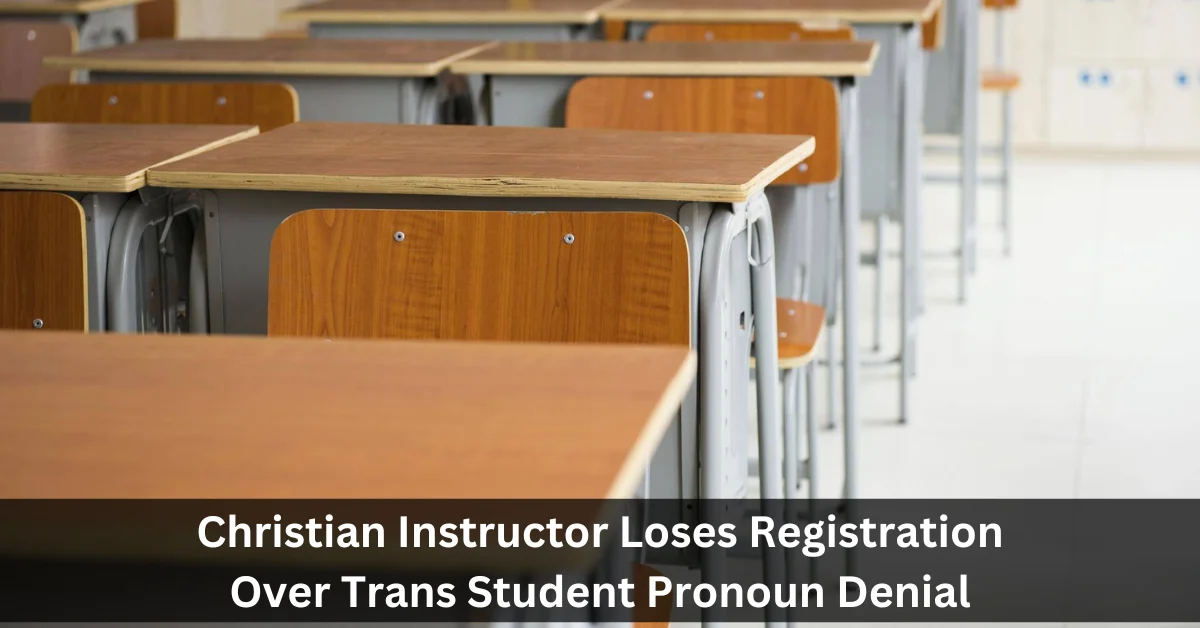After refusing to address one of his transgender students using the preferred pronouns and name, a New Zealand high school teacher, he revoked his teaching license.
The Teaching Council of Aotearoa New Zealand has responded by stating that all students have an “entitled to feel that schools are a safe space, where they are respected and valued” and that teachers are forbidden from using their position of power to “undermine the personal identity of their learners, or to influence them inappropriately.”
Another prominent LGBT+ organization in New Zealand has also spoken out on the subject, stressing the significance of schools respecting kids’ identities.
After receiving a complaint from the student, the instructor was brought before the Disciplinary Tribunal in February. This impartial body has each panel chaired by a lawyer and two knowledgeable teachers. According to the judgment made public today, a 14-year-old student in the teacher’s math class was transitioning from a girl to a guy and had entered a “preferred male name” in the school’s web portal.
However, the math teacher did not use the student’s preferred name and pronouns, whose name was omitted from the tribunal’s findings. Later, during a morning tea break, he visited with the student and explained that gender transformation went against his Christian views.
The student came up with a solution, telling the teacher he may use she/her pronouns even though his preferred name could refer to him. Refusing again, the teacher added that she did not want the student to “go down a path of sin” in her refusal.
The tribunal was informed that the man’s Christian views prevented him from accepting the idea of gender transitioning and using the individuals’ preferred names or pronouns. However, when the teacher appeared independently during the hearing, he fiercely denied any wrongdoing, adding that doing so would amount to significant misconduct and child abuse.
The teacher continued to misgender the student throughout his testimony and insisted he was exempt from using their preferred name since they were under 18. In response, the tribunal said the teacher would have no trouble calling a “Matthew” “Matt” if they choose.
After that, the teacher claimed that forcing him to use pronouns other than those given at birth for a pupil violated his “core Christian belief,” which he claimed was “foundational for New Zealand.”
The teacher added that it was incorrect for schools to promote or teach kids that gender is a choice and that anyone trying to change from the gender they were given at birth needs “help and deliverance.” The teacher’s recommendations also included homos*xuality, which he described as the “obvious next sin” following shifting.
He also gave the court numerous passages from the Bible that said things like “Man should only lie with a woman” and that Homos*xuality steps away from “God’s plan.” He also brought up abortion during his testimony to the tribunal, arguing that all types of abortion violate Christian principles and should be treated as mu*der.
Christian teacher loses registration after refusing to use trans student’s pronouns Good job. Teachers have no right to enforce religious morality on students. https://t.co/hIHLccOMWK
— Just Me (@Nic18111) June 19, 2023
A student who wanted to identify as “earthly royalty or a judge” and who wanted to be addressed with the pronoun “Your Honour” was the example used by the teacher to compare pronouns in subsequent submissions.
“Although these examples may seem absurd, they are the same logic as calling a girl a boy, or a boy a girl and may lead to abuse of teachers and others. Is it appropriate for a teacher to call a student by the pronoun ‘Your Honour’ or to expect teachers to refer to students as different animals?” the instructor advised.
He concluded that he thought there was no basis for a misbehavior accusation and that he was operating in the student’s best interests. The tribunal disagreed, stating there was “no hesitation” in their minds that the teacher had engaged in significant wrongdoing.
“For a trusted adult teacher to not only ignore the student’s wishes and the instruction of the school but also to isolate them and advise them it was wrong, risked quite significant harm,” Tim MacKenzie, the deputy chair, wrote about his choice.
The tribunal concluded that the kid had valiantly handled the teacher’s behavior. Still, it stated that a student should never be required to attempt to negotiate a settlement for a situation like this. It stated that notwithstanding the teacher’s response and stance, it was “not moving to punish” him. The panel concluded the teacher’s testimony was “unrealistic hysteria” as well.
“The arguments referencing the risk of homos*xuality and abortion may well be welcome and normal within the context of [the teacher’s] private life and views. However, they are disgraceful when used in the present context.”
The teacher was forced to pay costs after the tribunal determined that the teacher’s license cancellation was the only suitable course of action. The judgment said that the teacher also left his position at the school.
Students ‘Entitled To Feel That Schools Are A Safe Space’
The Teaching Council of Aotearoa New Zealand said in a statement that all children have “entitled to feel that schools are a safe space, where they are respected and valued.”
“All teachers are legally bound and regularly recommit to comply with the code which sets out the commitments to the teaching profession, learners, families and whānau and society. In essence it describes how a teacher must behave. When the code is broken, it can result in disciplinary action being taken.”
The Teaching Council stated in its statement that it was a significant matter of public interest and wanted to clarify its expectations for teachers, even though it could not comment on specific situations to maintain confidentiality and natural justice.
If you want to see other related posts, you can click on the link given below:
- Over 2 Million American Children Rely On School Meals During The Summer
- Alex Jones’ Defamation Trials Over School Sh00ting Lies
- Florida’s Federal Student Loan Debt: A Look At The Outstanding Balance
“Teachers need to help learners to think critically about issues and understand different views, theories, perspectives and experiences and it is not okay for a teacher to use their authority to undermine the personal identity of their learners, or to inappropriately influence them to take a course of action.”
“It is the Teaching Council’s position that in this case the teacher should have applied the code and the values of the teaching profession, when asked by a student to use their preferred pronouns.”
Tyler is a passionate journalist with a keen eye for detail and a deep love for uncovering the truth. With years of experience covering a wide range of topics, Tyler has a proven track record of delivering insightful and thought-provoking articles to readers everywhere. Whether it’s breaking news, in-depth investigations, or behind-the-scenes looks at the world of politics and entertainment, Tyler has a unique ability to bring a story to life and make it relevant to audiences everywhere. When he’s not writing, you can find Tyler exploring new cultures, trying new foods, and soaking up the beauty of the world around him.


